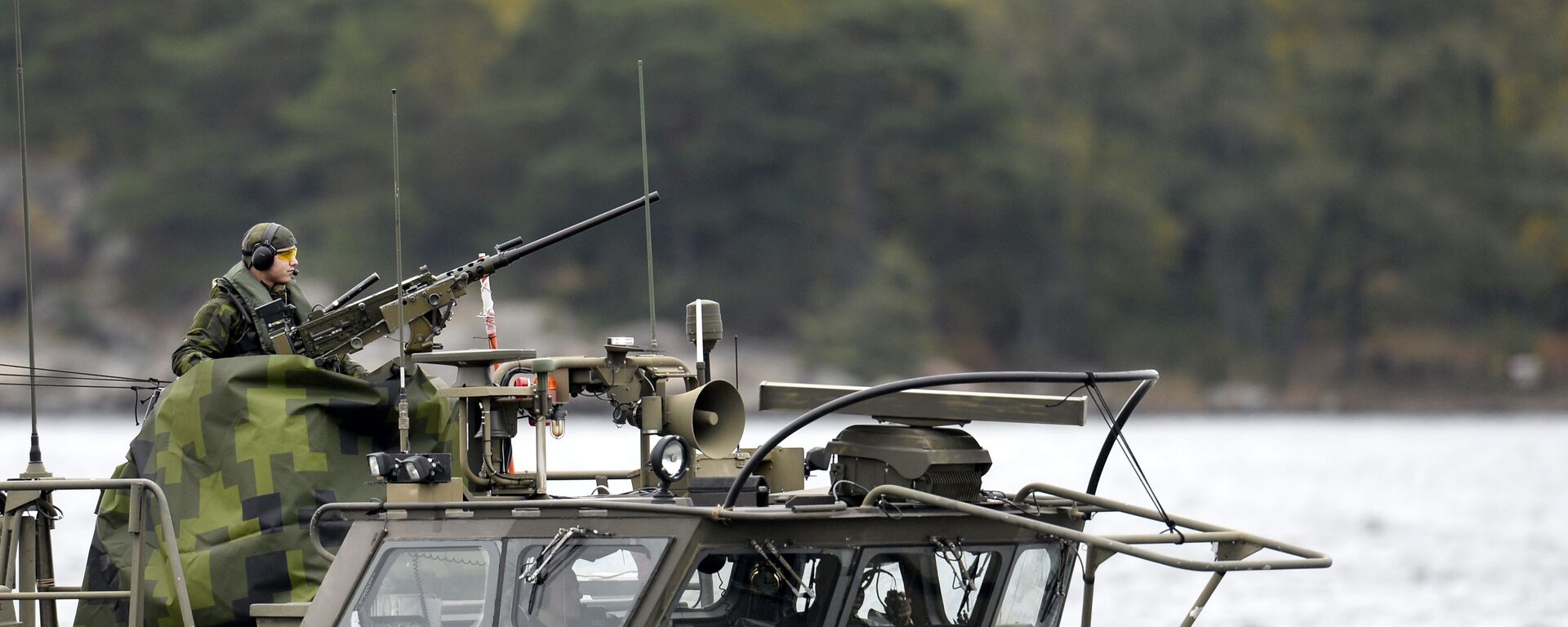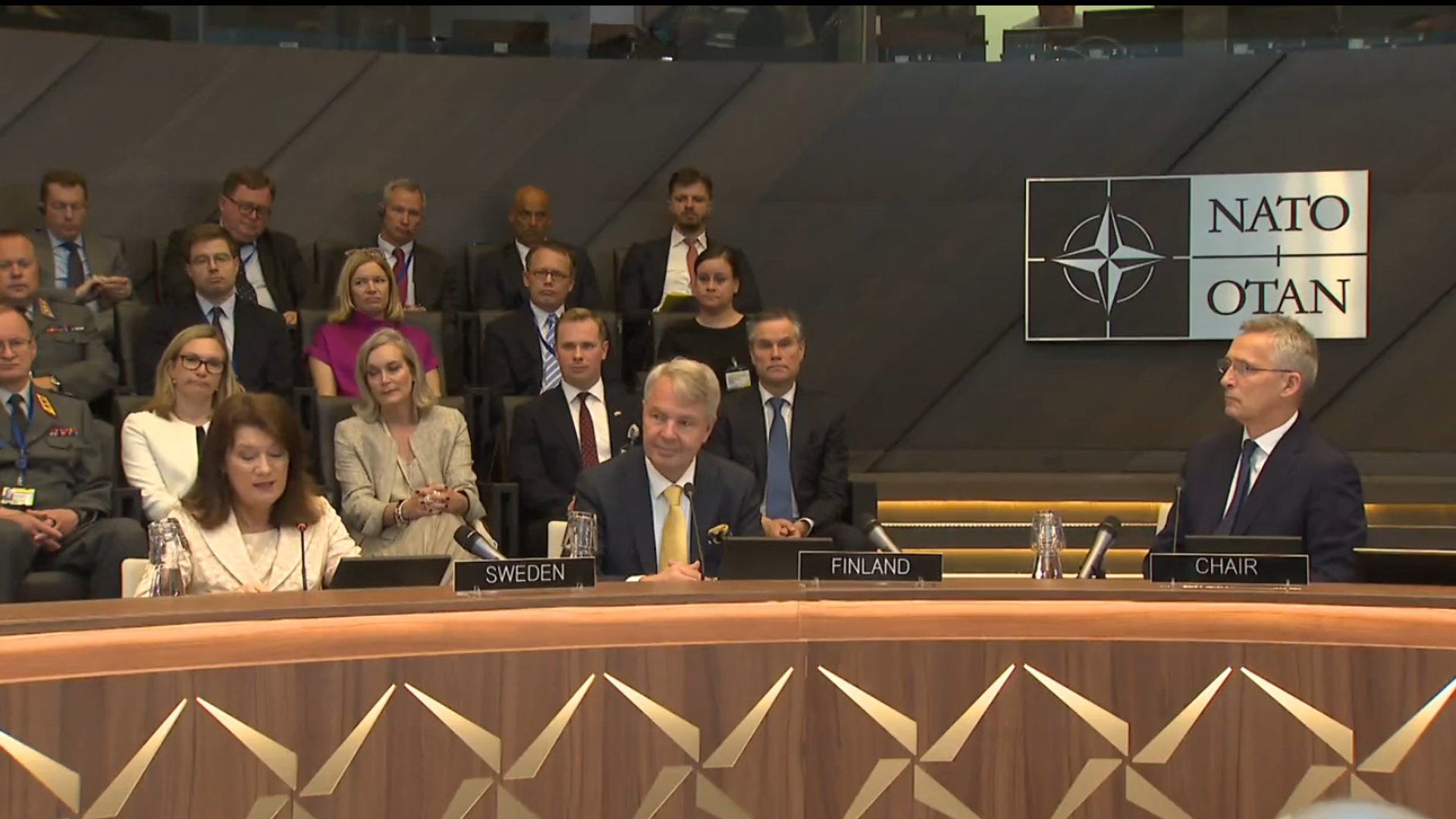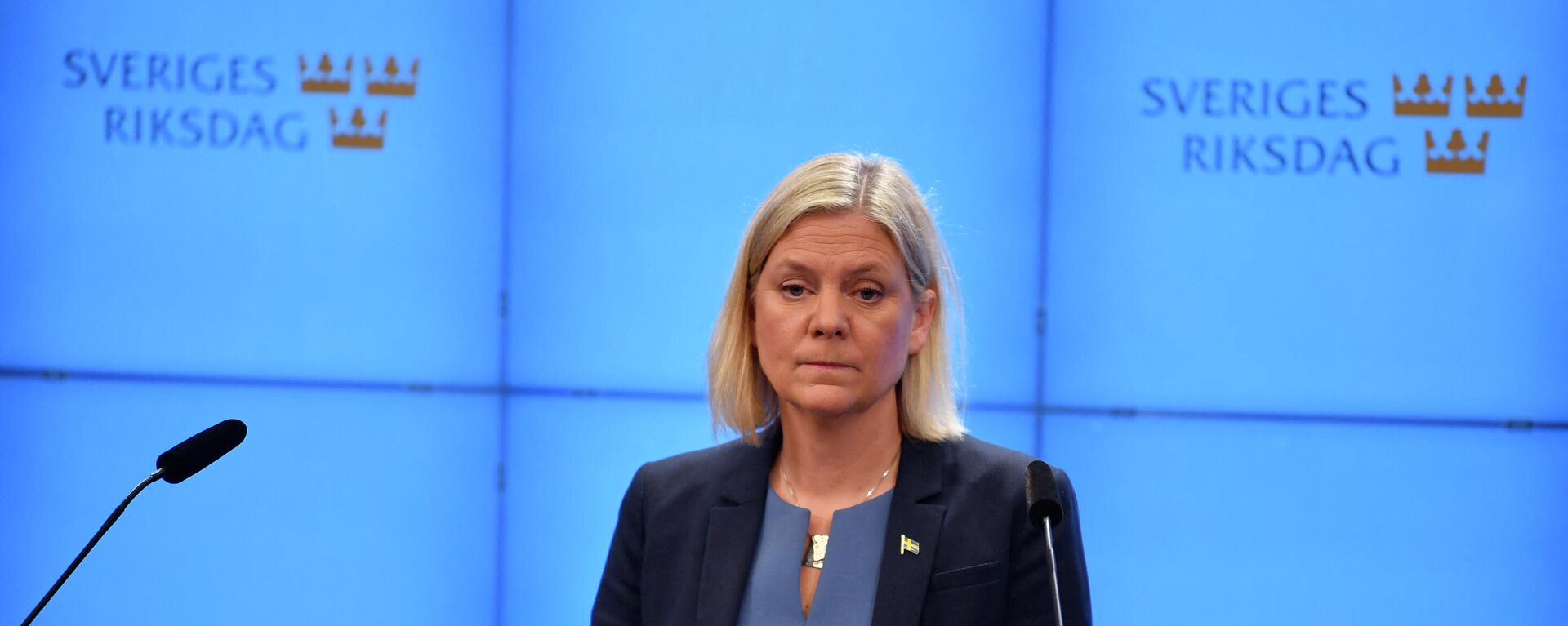https://sputnikglobe.com/20220705/nato-reps-sign-protocols-on-finland-and-swedens-accession-to-western-alliance-1096968719.html
NATO Ambassadors Sign Accession Protocols for Sweden & Finland
NATO Ambassadors Sign Accession Protocols for Sweden & Finland
Sputnik International
The Finnish and Swedish governments applied for NATO membership this spring in the wake of Russia's military operation in Ukraine, breaking with traditions of... 05.07.2022, Sputnik International
2022-07-05T09:29+0000
2022-07-05T09:29+0000
2022-07-05T12:27+0000
nato
finland
sweden
protocol
https://cdn1.img.sputnikglobe.com/img/07e6/07/05/1096969947_0:4:1424:805_1920x0_80_0_0_f9de69ccfffa8c1dccbe9b909437bbfc.png
Ambassadors from NATO countries formally signed the accession protocols for Finland and Sweden at NATO headquarters in Brussels, Belgium on Tuesday, with Finnish and Swedish foreign ministers Pekka Haavisto and Ann Linde attending the ceremony."This is truly an historic moment. For Finland, for Sweden, for NATO, and for our shared security," NATO chief Jens Stoltenberg said.The pair of Nordic nations speedily completed accession talks on Monday, with NATO saying in a press statement that the two countries had "formally confirmed their willingness and ability to meet the political, legal and military obligations and commitments of NATO membership" following their formal invitation into the bloc at last week's alliance summit in Madrid, Spain.The accession protocols will now need to be formally ratified by each of the alliance's 30 allies.Foreign Minister Haavisto expressed Finland's appreciation to the alliance for supporting Helsinki's membership bid, and recalled that "over the past thirty years, Finland and NATO have had a long-standing and pragmatic partnership," starting with the 'Partnership for Peace' program in 1994.Foreign Minister Linde called the accession protocols signing ceremony a "historic day for Sweden and Finland."Officials from NATO countries have repeatedly emphasized the significance of Finland and Sweden's entry into the Western alliance in recent days, with Polish President Andrzej Duda boasting Monday that the Baltic Sea would become an "internal basin" of the NATO alliance after the Nordic countries joined the bloc.Turkey allowed the Nordic nations' NATO bid to move forward on the eve of the Madrid summit after an agreement was reached on Helsinki and Stockholm's sheltering of Kurdistan Workers Party (PKK) members. Ankara categorizes the PKK as a "terrorist" organization, and threatened to block Finland and Sweden's applications to join the alliance indefinitely until its concerns were alleviated.Finland and Sweden have been slowly gravitating toward NATO since the end of the Cold War, with both countries signing the 'Partnership for Peace' program in 1994, and taking part in NATO's occupations of Afghanistan and Kosovo. The Nordic nations have also joined regular large-scale alliance drills in northern Europe, including ground-based, aerial and naval maneuvers. During the Cold War, both countries maintained formal neutrality, although Sweden secretly collaborated with the United States and promised to support the Western bloc in the event of a major East-West conflagration.Finland became neutral after the Second World War, and successfully managed to enjoy friendly relations with the Soviet Union and its successor, Russia, for more than 75 years. Sweden has maintained formal neutrality since the 19th century, and has not taken part in any large-scale European war since 1814. However, during the Second World War, the country exported millions of tons of crucial iron ore exports to support the Nazi German war effort.Russia has expressed consternation over the Nordic nations' NATO bids. Last week, President Putin warned that while Moscow does not have the kinds of "problems" with Finland and Sweden as it does with Ukraine, Helsinki and Stockholm "should plainly and clearly realize that [while] there were no threats before, now, if military contingents and infrastructure are deployed there, [Russia] will have to respond in a mirrored fashion."Russia shares a 1,340 km border with Finland. NATO's prospective expansion to this frontier will be just the latest round of the Western alliance's eastward push. Since 1990 and the reunification of Germany, every former member of the defunct Soviet-led Warsaw Pact alliance, three republics of the former USSR, and four republics of Yugoslavia have been swallowed up by the Western bloc.
https://sputnikglobe.com/20220704/swedish-pm-refuses-to-say-if-stockholm-will-deport-kurds-wanted-in-turkey-as-part-of-nato-deal-1096934710.html
https://sputnikglobe.com/20180830/sweden-finland-aland-troops-1067587465.html
finland
sweden
Sputnik International
feedback@sputniknews.com
+74956456601
MIA „Rossiya Segodnya“
2022
News
en_EN
Sputnik International
feedback@sputniknews.com
+74956456601
MIA „Rossiya Segodnya“
Sputnik International
feedback@sputniknews.com
+74956456601
MIA „Rossiya Segodnya“
nato, finland, sweden, protocol
nato, finland, sweden, protocol
NATO Ambassadors Sign Accession Protocols for Sweden & Finland
09:29 GMT 05.07.2022 (Updated: 12:27 GMT 05.07.2022) The Finnish and Swedish governments applied for NATO membership this spring in the wake of Russia's military operation in Ukraine, breaking with traditions of neutrality going back generations.
Ambassadors from NATO countries formally signed the accession protocols for Finland and Sweden at NATO headquarters in Brussels, Belgium on Tuesday, with Finnish and Swedish foreign ministers Pekka Haavisto and Ann Linde attending the ceremony.
"This is truly an historic moment. For Finland, for Sweden, for NATO, and for our shared security," NATO chief Jens Stoltenberg
said.
The pair of Nordic nations speedily completed accession talks on Monday, with NATO saying in a
press statement that the two countries had "formally confirmed their willingness and ability to meet the political, legal and military obligations and commitments of NATO membership" following their formal invitation into the bloc at last week's alliance summit in Madrid, Spain.
The accession protocols will now need to be formally ratified by each of the alliance's 30 allies.
"NATO's door remains open to European democracies who are ready to and willing to contribute to our shared security. This is a good day for Finland and Sweden, and a good day for NATO. With 32 nations around the table, we will be even stronger, and our people will be even safer as we face the biggest security crisis in decades," Stoltenberg said.
Foreign Minister Haavisto expressed Finland's appreciation to the alliance for supporting Helsinki's membership bid, and recalled that "over the past thirty years, Finland and NATO have had a long-standing and pragmatic partnership," starting with the 'Partnership for Peace' program in 1994.
Foreign Minister Linde called the accession protocols signing ceremony a "historic day for Sweden and Finland."
"The signing of the accession protocols will be an important step toward our full NATO membership...As a future member of the alliance, Sweden will contribute to the security of all allies. We are convinced that our membership will strengthen NATO and add to the stability in the Euro-Atlantic area," Linde said.
Officials from NATO countries have repeatedly emphasized the significance of Finland and Sweden's entry into the Western alliance in recent days, with Polish President Andrzej Duda
boasting Monday that the Baltic Sea would become an "internal basin" of the NATO alliance after the Nordic countries joined the bloc.
Turkey allowed the Nordic nations' NATO bid to move forward on the eve of the Madrid summit after an agreement was reached on Helsinki and Stockholm's sheltering of Kurdistan Workers Party (PKK) members. Ankara categorizes the PKK as a "terrorist" organization, and threatened to block Finland and Sweden's applications to join the alliance indefinitely until its concerns were alleviated.
Finland and Sweden have been slowly gravitating toward NATO since the end of the Cold War, with both countries signing the 'Partnership for Peace' program in 1994, and taking part in NATO's occupations of Afghanistan and Kosovo. The Nordic nations have also joined regular large-scale alliance drills in northern Europe, including ground-based, aerial and naval maneuvers. During the Cold War, both countries maintained formal neutrality, although Sweden secretly collaborated with the United States and promised to support the Western bloc in the event of a major East-West conflagration.
Finland became neutral after the Second World War, and successfully managed to enjoy friendly relations with the Soviet Union and its successor, Russia, for more than 75 years. Sweden has maintained formal neutrality since the 19th century, and has not taken part in any large-scale European war since 1814. However, during the Second World War, the country exported millions of tons of crucial iron ore exports to support the Nazi German war effort.

30 August 2018, 06:23 GMT
Russia has expressed consternation over the Nordic nations' NATO bids. Last week, President Putin
warned that while Moscow does not have the kinds of "problems" with Finland and Sweden as it does with Ukraine, Helsinki and Stockholm "should plainly and clearly realize that [while] there were no threats before, now, if military contingents and infrastructure are deployed there, [Russia] will have to respond in a mirrored fashion."
Russia shares a 1,340 km border with Finland. NATO's prospective expansion to this frontier will be just the latest round of the Western alliance's eastward push. Since 1990 and the reunification of Germany, every former member of the defunct Soviet-led Warsaw Pact alliance, three republics of the former USSR, and four republics of Yugoslavia have been swallowed up by the Western bloc.



